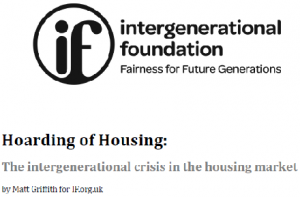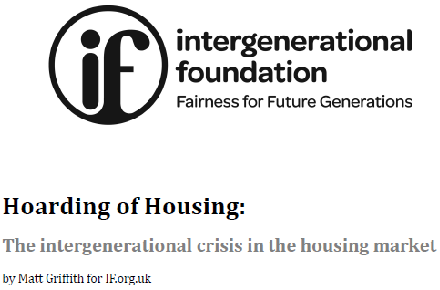There are now over 25 million unoccupied bedrooms in British homes. This figure, has been released by new campaign group the Intergenerational Foundation, starkly highlights how much of Britain’s housing is unused despite the desperate housing shortage that affects the younger generation.
 |
| [relatedPosts title=”Related Posts”] |
|
|
The under-occupation of housing has jumped by around 45% since 2003 and is continuing to grow at an alarming pace. This is mainly because older people are living longer and staying in the family home rather than downsizing to more appropriate accommodation.
“The ‘housing crisis’ is increasingly an issue of how our housing stock is shared between younger and older generations,” says Angus Hanton, co-founder of the Intergenerational Foundation, which launches today with the aim of drawing public attention to Britain’s growing intergenerational divide. “The divide between the housing ‘haves’ and ‘have nots’ has moved from being one dominated by wealth or class to one dominated by age,” Hanton adds.
IF’s report entitled ‘Hoarding of Housing’ shows that about one-third of all British homes are now “underoccupied” on common definitions, up from 20%. This means while younger families are increasingly squeezed into small flats and under-sized houses, older people are often rattling around in big houses with many bedrooms standing empty, often for years. 51.5% of those aged over 65 now live in homes with two more bedrooms than they need. 50% of single households where the owner is aged over 60 (3.7 million people) now have 3 spare bedrooms or more.
IF does not blame older generations for their position – it believes the tax system is at fault for not encouraging people to move at the right time to the right-sized accommodation for them. With property having been, at least until recently, a seeming one-way bet, there are logical reasons – under the current tax system – for people to see their houses as a store of value, and want to hang on to them.
“It is perfectly understandable that retired people cling to their home long after it has outlived its usefulness as a place to bring up a family in. But there are profound social consequences of their actions which are now causing real problems in a country where new house building is almost non-existent,” says IF report co-author Matthew Griffiths.
The lack of downsizing is a particularly British problem. IF figures show that Americans, for example, are almost twice as likely to downsize when their children leave home than British people. This is almost certainly due to the way the British tax system encourages people not to move house.
IF is not urging government to round on older generations and turf them out of their homes. But it is calling for changes to the tax system to encourage the downsizing process. Measures could include an exemption
from stamp duty for the over 60s when they move to a smaller property. The government should also look at scrapping council tax and replacing it with a proper land tax, to reflect the social cost of occupying housing, particularly housing that is larger than one’s needs.
The dream of owning one’s home is no longer a reality for most young people. Home ownership, which had been growing steadily since World War Two, went abruptly into reverse in 2003 and it is now steadily declining. Similarly, the number of people having to rent – mainly young people – is now rising steadily.
IF emphasises that the huge surge in house prices in Britain over the past few decades does not represent any increase in the country’s net wealth. All it represents is a massive transfer of wealth from young people to older people, as the younger generation is forced to pay ever higher prices to claw its way up the property ladder.
The huge increase in wealth enjoyed by those lucky enough to have owned homes from the late 1990s onwards has been matched by the massive increase in mortgage debt taken on by younger people over the same period – debts that explain the increasing disenchantment of young people, already struggling with the knowledge that they will have to work longer, and for worse pensions, than their parents.
“The inter-generational compact has been broken. But it can be fixed. Properly designed policies could help us to use our existing housing stock much more effectively and to the benefit of all, not just a lucky few,” says Ashley Seager, IF co-founder.
Tessa Jowell, Shadow Minister for London and The Olympics adds, “This important report from the Intergenerational Foundation shows in stark relief how young people are struggling to raise a family in a home of their own, breaking what Ed Miliband has called the promise of Britain – that each generation who has worked hard would be more prosperous and have more opportunities than the last. We know that older generations already do so much to support younger ones, for example with grandparents sharing caring responsibilities for their grandchildren. This report suggests that housing is another area where generations sharing together could help to lessen the UK’s housing shortage for younger people while providing more suitable accommodation for older people.”
Further Information
- ‘Hoarding of Housing: The intergenerational crisis in the housing market’ pdf is available here.
-
The Intergenerational Foundation (http://www.if.org.uk) exists to promote the interests of younger and future generations in government policy making.
-
The 25 million empty rooms figures is for England. Were reliable figures for Wales, Scotland and Northern Ireland available, the figure would be even higher. The figure counts rooms that are surplus to requirements under government definitions of occupation rates. Full definitions are in the report.
- The home ownership rate in Britain peaked at 70.9% in 2003 and is now down to around 67.4%, according to government figures. This is because home ownership among the under 35s is falling faster than it is rising for the over 65s, figures from the English Housing Survey show.
- There are now around 8 million “under-occupied” houses in England, equivalent to around 37% of the total. Four decades ago only around 20% of homes were under-occupied. This number has risen 45% since 2003. Some 24 million people, or 46% of the population, are judged to be living in under-occupied homes. Most people living in under-occupied homes do not have children living with them.
- The UK has much lower levels of downsizing than the US. Over any five-year period one in every eight British homeowners will downsize, compared to one in every five US homeowners. Among owner-occupiers in the US and Britain, differences in mobility become even more pronounced as people get older – in the US the probability of moving increases as you get older than 60, in the UK the probability diminishes.
- Internationally comparable figures show that UK households have more debt, and more mortgage debt, relative to their income than households in any other major economy. They also show that household indebtedness has increased more in the UK since 2002 and that almost all the increase in household indebtedness in the UK has been as a result of more mortgage borrowing. This represents a huge intergenerational transfer, the likes of which the country has never seen before.
- Older home-owner households have far higher levels of housing equity relative to their predecessors. In 1980, housing equity was roughly equal to 100% of UK GDP. But by 2007, it had risen to 185%.





